
Continuing my series of strategies for Brave New World, I am going to take a moment to discuss one of (if not the) most sorely misunderstood civilizations from the vanilla game: Gandhi's India. India received a very minor tweak in Brave New World (its unique building was modified to provide tourism instead of gold), but the new trade route mechanics radically change the way that India should be played. In some ways, the new features make India feel like a completely new civilization!
The ancient civilization of India is one of the world's most populace and diverse countries. More than 1/6th of the world's population currently calls India home (that's over a billion people!), it is one of the cultural and spiritual centers of the world. India is the birthplace of both the Hindu and Buddhist religions, which make up third and fourth most populous religions today. The less-populous faith of Jainism also has roots in India. In addition to the variety of religions, there are also over 100 distinct languages that are spoken in India! Indian society used to follow a rigid caste system in which a person's status in life is determined at birth. Although this caste system is not enforced (and is actively discouraged by the government), it remains a persistent force in the nation, and still leads to a great deal of prejudice and conflict within the country.
One of the most significant leaders of Indian history (and world history) is Mohandas Gandhi. In the early 1900's, India was under British occupation, and Gandhi, the son of the Prime Minister of the small state of Porbandar, was successful in leading an unprecedented non-violent rebellion to drive the foreign rule out. This peaceful rebellion lead to Gandhi being recognized as one of the most courageous and moral leaders the world has ever known. Indians affectionately refer to him as "Bapu" (translation: "father") in recognition of his role in creating the modern Indian nation. His birthday, October 2, is a national holiday in India, and is celebrated outside of India as the International Day of Non-Violence. Sadly, he was assassinated in 1948 (at age 78) by a Hindu nationalist who believed that Gandhi showed too much favoritism to Pakistan, one of India's bitter rivals. The assassin was tried and executed the following year, and Gandhi's ashes were distributed around the country for numerous memorial services.
Gandhi's representation in Civilization V gets a lot of undeserved criticism from some players, who often cite India as the "worst civ in the game" based solely on the fact that he is the only civ with a penalty explicitly stated in his unique ability (except for Venice in Brave New World), and that his unique unit is in some ways inferior to the unit it replaces. However, it is important to note right off the bat that there are plenty of civs who receive indirect penalties as part of their uniques. But the "Population Growth" ability, itself, is very poorly understood. Many players assume that this means that India must be played with a small empire, and that India cannot compete for any victory except for culture or diplomatic. This is simply not the case, and I'm going to explain why!
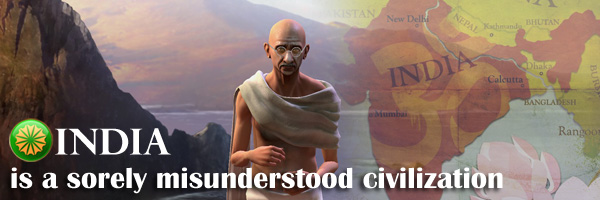
India's uniques in Civilization V

India's uniques tend to favor a turtle strategy, by encouraging paced, deliberate expansion, large growth, and empire defense.
Population Growth
"Unhappiness from number of Cities doubled, Unhappiness from number of Citizens halved."

Gandhi's national ability enables India to grow massive cities! It can also act as a significant deterrent to founding new cities early in the game; however, if you stop to do the math, you'll see that as your cities grow, the positives will quickly outweigh the negatives (regardless of how many cities you have). The only thing you want to avoid with Gandhi is founding cities in places where they won't grow. Pace your expansion, and you'll do fine.
With Brave New World's internal trade routes, Indian cities can grow faster to take advantage of Population Growth. Combined with the extra happiness sources that Gods & Kings had introduced, and India can easily be the happiest civilization in the game - regardless of its size.
The increased Happiness leads to more Golden Ages (temporarily increasing production, gold, science, and culture), and it supports larger populations that can be assigned to more specialist slots (awarding more Great People). There are a couple important caveats about the Indian Population Growth ability though that are not disclosed in the description:
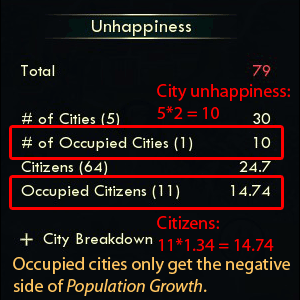
Occupied City receives 2x unhappiness for the city, but does not receive the 50% unhappiness from citizens.
Local Happiness: India's local happiness cap is equal to 2/3 the population rounded up (ex: for city sizes 5 and 6, the cap is 4 happiness), instead of equal to the population for every other civilization (ex: for city sizes 5 and 6, the caps are 5 and 6 happiness respectively). This is not explained anywhere in India's trait description or Civilopedia entry.
Occupied Cities: The double unhappiness from cities also applies to Occupied cities (annexed cities without a Courthouse), but the half unhappiness for population does not. This means that if your happiness surplus is small, then you should wait to annex a city until after the Resistance period is over and if you have enough Gold to cash buy a Courthouse (or get one automatically from Order's Iron Curtain tenet).
This is especially important since unhappiness penalties for Occupied cities are larger than for Non-Occupied cities. The occupied city penalty is 5 unhappiness versus a non-occupied penalty of 3, and the unhappiness per population is 1.34 versus 1 [Standard or smaller map size, Prince difficulty or higher].
War Elephant

Game Info: "A fast Ranged Unit highly effective on flat ground. Only the Indians may build it. This Unit has a higher Combat and Ranged Strength than the Chariot Archer, which it replaces."
Civilopedia Strategy: "The War Elephant is the Indian unique unit, replacing the Chariot Archer. It is more powerful (if slower) than the Chariot Archer and can move through any terrain without the Chariot Archer's penalty. A mounted unit, the War Elephant is quite vulnerable to the Spearman."
Replaces: Chariot Archer
Requirements: The Wheel technology, and 1 gold per turn maintenance (same as Chariot Archer).
Obsoleted: Chivalry technology (same as Chariot Archer).
Cost: 70 Production (+14 [+25%] from Chariot Archer) / 140 Faith (+28 [+25%] from Chariot Archer)/ 310 Gold (+50 [+19%] from Chariot Archer) [Standard speed].
Attack Type: Ranged, Combat Class: Archery,
Strength: 9 (+3 [+50%] from Chariot Archer),
Range: 2 (same as Chariot Archer),
Ranged Strength: 11 (+1 [+10%] from Chariot Archer).
Movement Speed: 3 (-1 [-25%] from Chariot Archer).
Bonuses: Does not have the Chariot Archer's penalty when entering rough terrain. Does not require horses.
Penalties: May not melee attack, and receives no defensive terrain bonuses (same as Chariot Archer).
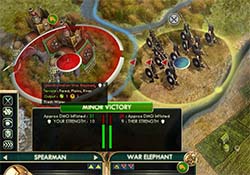
Contrary to the Civilopedia, War Elephants
are not vulnerable to spears or pikes.
The War Elephant is a very "meh" unit. It doesn't have the rough terrain penalty of Chariot Archers, but it defeats that bonus with lower overall speed and doesn't receive a terrain bonuses towards its combat strength, so there isn't any benefit to placing it in rough terrain. Since India doesn't have any strong bias towards starting next to forests, jungles, or hills, there's no guarantee that the War Elephant will benefit from its lack of a rough terrain penalty. It does have considerably stronger defensive strength, but isn't significantly better on offense. The slight bump in stats may not justify its 25% increased production cost.
The War Elephant is an early-game unique unit, and is more expensive than the basic Chariot Archer that it replaces, so you probably won't be able to afford to build too many of them before they become obsolete. The War Elephant is also in the auspicious position of being a replacement for the Chariot Archer, which is a very "meh" unit to begin with. This is primarily due to the fact that there is no upgrade to another mounted ranged unit. The War Elephant (as with the Chariot Archer) upgrades to the melee Knight, so any ranged promotions that you may have given it during its short period of usefulness become moot. Its production is also not buffed by the Stable, since it has a combat type of "Archery" instead of "Mounted".
Being a ranged unit does give it one advantage: it is not vulnerable to the anti-mounted bonus of Spears and Pikes!
So what is it good for? Well, it's a defensive ranged unit that you can move around effectively even in rough terrain. It has the same ranged strength as the Composite Bow, but is available earlier and is slightly cheaper and faster. It's good for defending your land from barbarians and early war rushes, and can be moderately effective if used in very early wars. Their increased movement and ranged strength makes them more valuable for hunting barbarians early in the game, if you want the extra gold and / or city state influence.
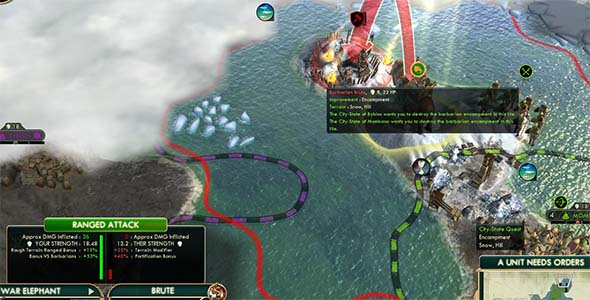
War Elephants are good at clearing barbarians for city states - especially for maritime city states!
Mughal Fort
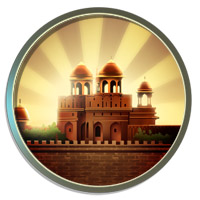
Game Info: "Provides +2 Tourism after Flight is researched.
City must have Walls."
Civilopedia Strategy: "The Mughal Fort is a Medieval-era building that increases the city's Defense Strength by 7, Hit Points by 25, and provides some Culture every turn. It is the Indian unique building, replacing the Castle. After Flight is learned, it provides +2 Tourism as well. Building Walls is a prerequisite for building the Mughal Fort."
Replaces: Castle
Requirements: Chivalry technology, and city must have Walls. This building does not require gold maintenance! (same as Castle)
Cost: 150 Production (-10 [-6.25%] from Castle)
Effects: +7 city strength, +25 city HP (same as Castle). +2 Culture. Generates +2 Tourism after researching Flight.
The Mughal Fort does not provide any better defenses to the city than the Castle that it replaces; however, it does provide bonus culture (same as a Monument). If you can save up enough money before founding a new city, purchasing Walls and a Mughal Fort in the new city will give you plenty of defense as well as act as a free Monument! Once Flight is researched, the Mughal Fort also produces +2 Tourism (previously this bonus was +3 Gold pre-Brave New World). The combination of +2 Culture and +2 Tourism is the same benefit as a Great Work, so you can almost think of your Mughal Forts as free Art!
Note that if you take Tradition's Legalism late, the Mughal Fort can be the free cultural building one of your first 4 cities receives. Since all defensive buildings are maintenance-free and the free cultural building becomes maintenance-free also, you may want to build/buy your Forts first or avoid having Walls in your cities before taking this policy so that you will get a maintenance-free Monument, Ampitheater, or Opera House instead.
Pacing yourself with the most misunderstood civilization in the game
When I was on Polycast (ep. 175), we had a discussion regarding the viability of India's Population Growth (@ 21:40). Ironically, in the very next episode (@ about 7:00), there was more criticism from the guest host that India's UA forces the player to play a small and tall empire. So this just goes to show how thoroughly ingrained this misconception is within the Civ V community.
But it is simply not the case that India is forced to stay small.
Put simply, the extra unhappiness that is generated by the city is completely offset by the reduced unhappiness from population once the city reaches six (6) population (Standard Map or smaller). This is not taking into account social policies or the presence of happiness buildings or other effects. But once an Indian city surpasses six population, it is producing less unhappiness than a non-Indian city of the same size. Since the unhappiness per city does not increase based on the number of cities that you own, this ability scales with any sized empire!
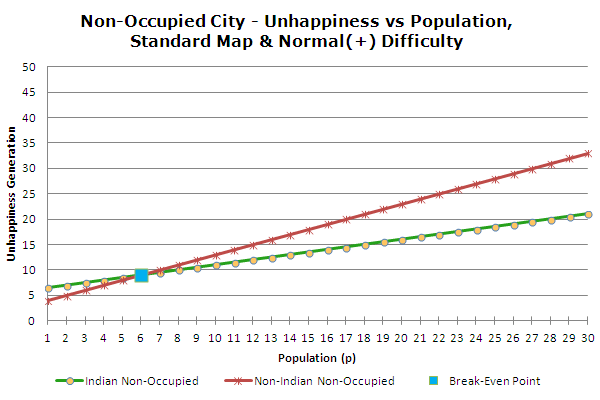
|
|
At six population, Indian cities begin to reap the benefits of "Population Growth" (standard map size and difficulty).
|
On larger maps, the per-city happiness is actually reduced (so that you can fill the map with more cities), so India's break even point is even lower on large and huge maps.
India is a civ that is dependent on a fairly favorable map. Having easy access to multiple distinct luxuries is critical to India's expansion desires. If you get stuck on a map that doesn't offer a wide array of available luxuries, then you will find that India will have trouble expanding.
Population Unhappiness Break-Even Points by Map Size
(Any Difficulty)
| Map | Break-even point |
|---|
| No Modifiers | All Modifiers |
|---|
| Map Size | c/k | Any City
M = 100% | Capital
M = 42.5% | Non-Capital
M = 85% |
|---|
| Standard (and smaller) | 3 | 6 | (14.11) 15 | (7.05) 8 |
| Large | 2.4 | (4.8) 5 | (11.29) 12 | (5.64) 6 |
| Huge | 1.8 | (3.6) 4 | (8.47) 9 | (4.23) 5 |
c: Unhappiness for the city (varies by Map Size & Difficulty)
k: Unhappiness per population point (varies by Difficulty)
The ratio of c/k does not change by Difficulty.
All Modifiers will give 42.5% population unhappiness in the Capital and 85% in other cities with Tradition's Monarchy policy (-50% population unhappiness in the Capital), Liberty's Meritocracy policy (-5% population unhappiness in Non-Occupied cities), and the Forbidden Palace world wonder (-10% population unhappiness in Non-Occupied cities).
NOTE: Meritocracy (Mer) & Forbidden Palace (FB) add together for a 15% discount.
Monarchy and Gandhi's UA are applied to the remaining unhappiness as 50% multipliers.
[UNHAPPINESS] = c*UA + k * (100% - Mer - FB) * (100% - Monarchy) * (100% - UA) * p
[Non-Indian Capital] = c + k * (100% - 5% - 10%) * (100% - 50%) * p
[Non-Indian Capital] = c + k * 42.5% * p
[Indian Capital] = 2*c + k * (100% - 5% - 10%) * (100% - 50%) * (100% - 50%) * p
[Indian Capital] = 2*c + k * 21.25% * p
|
What is true is that the player must pace your expansion early. The double unhappiness can make founding your first one or two new cities feel prohibitively difficult. Make sure to improve all of your local luxuries and try to trade for additional ones or befriend some Mercantile City-States before you start founding new cities. This should give you enough excess happiness to be able to found a new city or two.
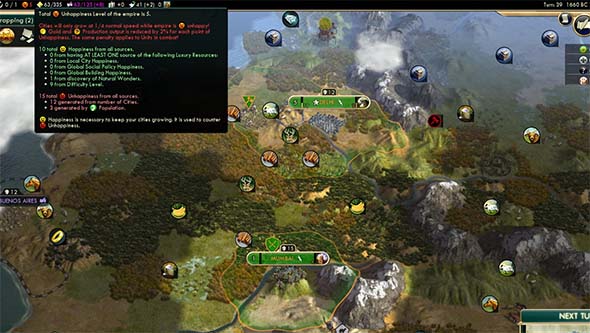
Expanding too quickly early in the game will lead to unhappiness.
Either tough it out, or make efforts to acquire excess happiness prior to settling.
Be sure to settle in locations where your cities will naturally grow (especially with your early cities) and where they'll be able to connect to luxuries that you don't already have. You'll be sending food to your cities for pretty much the entire game, but you don't want to found cities that are dependent on receiving food from trade routes.
Construction should be a fairly high-priority early-game tech, so that you can build Colosseums in your cities in order to offset the extra unhappiness. Trapping is also very helpful if you have the horses or elephants necessary to build circuses. And Calendar and Masonry will allow you to turn nearby stone or marble into additional happiness if you have those resources nearby.
Tradition is also strongly recommended regardless of whether you go tall or wide. The growth bonuses for the capital and four core cities will be critical for maximizing the usefulness of your national trait.
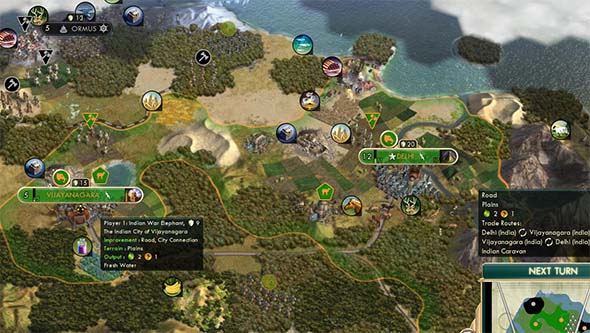
Use internal trade routes to quickly grow your core cities.
Send as many food trade routes as possible to your own cities in order to grow them as large as possible as quickly as possible. This is the opposite of civs like Morocco, Arabia, and Germany, who all benefit from sending trade routes to foreign cities. Focusing on maintaining friendships and alliances with as many maritime city states as possible will also boost your growth.
The best way to increase growth is to buy luxuries that your cities request for "We Love the Leader Day". "We Love the Leader Day" grants temporary 25% food bonuses in the respective city. One trick to getting more "We Love the Leader Days" is to trade away your last copy of a luxury in exchange for another civ's luxury. Such a trade is happiness neutral, since you're exchanging one luxury for another. Since your luxury is no longer part of your trade network, your cities may demand it for a "We Love the Leader Day", so when the trade deal ends (either by expiring or via a declaration of war), you'll get your own luxury back along with a hefty growth bonus. If you run out of duplicate luxuries of your own to trade, but other civs still have tradeable luxuries available, then this can be a great way to cycle through "We Love the Leader" luxuries!
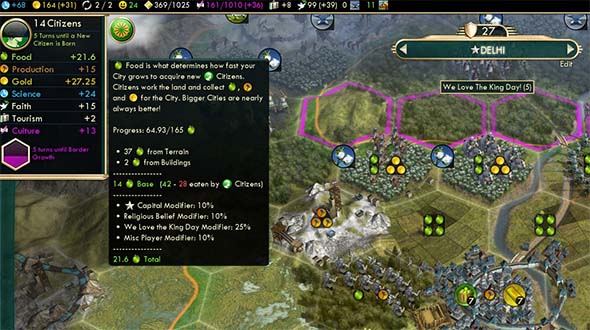
Tradition social policies, wonders, religion, maritime friends, and "We love the King Day" will grow your capital.
Another strategy for minimizing the effect of the double unhappiness penalty is to wait to found a new city until you enter a Golden Age. While in a Golden Age, happiness has no effect, so it won't matter if that new city will push you over the edge into negative happiness. The extra gold that you'll receive from the Golden Age can also be used to quickly purchase Colosseums or other happiness buildings so that you will be less likely to fall into unhappiness when the Golden Age ends. Having a steady stream of Great Artists is the best way to trigger Golden Ages, so you should be sure to construct your Artist's Guild early in the city with the National Epic (and preferably a Garden) and keep it stocked with specialists at all times! When you pop an artist, consider holding it in reserve until you train a settler and are ready to found a new city.
Once your core cities start to grow to respectable sizes and you have a network of luxuries or city state allies, you should notice that you'll start to have a happiness surplus. This surplus can then be cashed in for more frequent late-game Golden Ages, or you can use it to support further mid-game expansion or conquest.
Unoccupied City Unhappiness by Population (lower is better)
Prince (& Higher) Difficulty - Standard (& Smaller) Map
| Pop | No Modifiers | With Modifiers |
|---|
| Any City (M=100%) | Capital* (M=42.5%) | Non-Capital (M=85%) |
|---|
| Non-Ind. | Indian | Diff | Non-Ind. | Indian | Diff | Non-Ind. | Indian | Diff |
|---|
| 1 | 4 | 6.5 | 2.5 | 3.4 | 6.2 | 2.79 | 3.8 | 6.4 | 2.58 |
|---|
| 2 | 5 | 7 | 2 | 3.8 | 6.4 | 2.58 | 4.7 | 6.8 | 2.15 |
|---|
| 3 | 6 | 7.5 | 1.5 | 4.3 | 6.6 | 2.36 | 5.6 | 7.3 | 1.72 |
|---|
| 4 | 7 | 8 | 1 | 4.7 | 6.8 | 2.15 | 6.4 | 7.7 | 1.3 |
|---|
| 5 | 8 | 8.5 | 0.5 | 5.1 | 7.1 | 1.94 | 7.2 | 8.1 | 0.88 |
|---|
| 6 | 9 | 9 | 0 | 5.6 | 7.3 | 1.72 | 8.1 | 8.6 | 0.45 |
|---|
| 7 | 10 | 9.5 | -0.5 | 6 | 7.5 | 1.51 | 8.9 | 9 | 0.03 |
|---|
| 8 | 11 | 10 | -1 | 6.4 | 7.7 | 1.3 | 9.8 | 9.4 | -0.4 |
|---|
| 9 | 12 | 10.5 | -1.5 | 6.8 | 7.9 | 1.09 | 10.7 | 9.8 | -0.83 |
|---|
| 10 | 13 | 11 | -2 | 7.2 | 8.1 | 0.88 | 11.5 | 10.2 | -1.25 |
|---|
| 11 | 14 | 11.5 | -2.5 | 7.7 | 8.3 | 0.66 | 12.4 | 10.7 | -1.68 |
|---|
| 12 | 15 | 12 | -3 | 8.1 | 8.6 | 0.45 | 13.2 | 11.1 | -2.1 |
|---|
| 13 | 16 | 12.5 | -3.5 | 8.5 | 8.8 | 0.24 | 14.1 | 11.5 | -2.52 |
|---|
| 14 | 17 | 13 | -4 | 8.9 | 9 | 0.03 | 14.9 | 11.9 | -2.95 |
|---|
| 15 | 18 | 13.5 | -4.5 | 9.4 | 9.2 | -0.19 | 15.8 | 12.4 | -3.38 |
|---|
| 16 | 19 | 14 | -5 | 9.8 | 9.4 | -0.4 | 16.6 | 12.8 | -3.8 |
|---|
| 17 | 20 | 14.5 | -5.5 | 10.2 | 9.6 | -0.61 | 17.5 | 13.2 | -4.23 |
|---|
| 18 | 21 | 15 | -6 | 10.7 | 9.8 | -0.83 | 18.3 | 13.7 | -4.65 |
|---|
| 19 | 22 | 15.5 | -6.5 | 11.1 | 10 | -1.04 | 19.1 | 14.1 | -5.07 |
|---|
| 20 | 23 | 16 | -7 | 11.5 | 10.2 | -1.25 | 20 | 14.5 | -5.5 |
|---|
| 21 | 24 | 16.5 | -7.5 | 11.9 | 10.5 | -1.46 | 20.9 | 14.9 | -5.93 |
|---|
| 22 | 25 | 17 | -8 | 12.4 | 10.7 | -1.68 | 21.7 | 15.4 | -6.35 |
|---|
| 23 | 26 | 17.5 | -8.5 | 12.8 | 10.9 | -1.89 | 22.6 | 15.8 | -6.78 |
|---|
| 24 | 27 | 18 | -9 | 13.2 | 11.1 | -2.1 | 23.4 | 16.2 | -7.2 |
|---|
| 25 | 28 | 18.5 | -9.5 | 13.6 | 11.3 | -2.31 | 24.2 | 16.6 | -7.62 |
|---|
| 26 | 29 | 19 | -10 | 14.1 | 11.5 | -2.52 | 25.1 | 17.1 | -8.05 |
|---|
| 27 | 30 | 19.5 | -10.5 | 14.5 | 11.7 | -2.74 | 26 | 17.5 | -8.48 |
|---|
| 28 | 31 | 20 | -11 | 14.9 | 11.9 | -2.95 | 26.8 | 17.9 | -8.9 |
|---|
| 29 | 32 | 20.5 | -11.5 | 15.3 | 12.2 | -3.16 | 27.7 | 18.3 | -9.33 |
|---|
| 30 | 33 | 21 | -12 | 15.8 | 12.4 | -3.38 | 28.5 | 18.8 | -9.75 |
|---|
*Tradition's Monarchy policy only affects the Capital. Difficulty Handicap: 100%. Per City Unhappiness (c): 3. Per Pop Unhappiness (k): 1. |
Growth and peace through spirituality and meditation
It is also highly recommended that an Indian player should invest in faith early in the game, and adopting Piety at an early stage is also very helpful. Religions can provide many growth and happiness benefits that India can take excellent advantage of. And the best part is that many of the beliefs that are good for India are rarely taken by the A.I.s!
Pantheons such as Fertility Rites (faster growth), Goddess of the Hunt (bonus food from Camps), or Sun God (bonus food from Wheat, Bananas, and Citrus) will help your cities to grow quickly. If you adopt Piety's Religious Tolerance policy, then you should also embrace minority religions that have pantheons like Sacred Waters (happiness in cities along rivers) or Goddess of Love (happiness in cities with 6 or more population).
You'll want to pick up a religious building (Pagodas are probably best) if you found a religion early enough to pick one, as they will provide you with an extra cushion of happiness to support mid-game expansion. If you plan to use Great Artists to spam Golden Ages, then avoid taking Cathedrals, since you will be unlikely to fill them with great works. Feed the World (Shrines and Temples provide food) and Swords into Plowshares (faster growth if not at war) make decent back-up options or second follower beliefs. Religious Centers (Temples provide 2 happiness) and Asceticism (Shrines provide 1 happiness) can also help you generate more happiness, and make good fall-back options. Lastly, if none of those are available, then Religious Community (bonus production per population) is a good choice, since your cities should grow large enough to maximize its benefits fairly soon.
Wonders
Wonders that provide growth or happiness bonuses are excellent targets for India to pursue. Since you'll be unlikely to settle more than one additional city before the Medieval era, you can spend that time going for Ancient or Classical wonders instead of training Settlers:
Temple of Artemis

The Temple of Artemis should be top priority. Unlike most other growth modifiers, Temple of Artemis actually grants your cities +10% Food (before being eaten by citizens). Since it's such an early wonder, it will almost certainly go in your capital. But if possible, consider putting it in your planned unit-producing city (a city that will ideally have Heroic Epic, the Barracks building line, Forge, Stable, and a Seaport). The +15% production for ranged units will help offset the increased cost of your War Elephants.
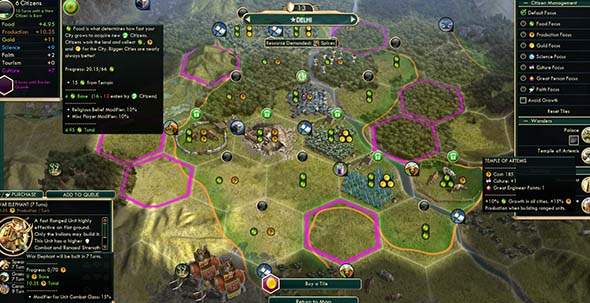
The Temple of Artemis helps India to maximize its unique ability and unit!
Hanging Gardens

If possible, try to follow up Artemis with the Hanging Gardens. You'll need to open the Tradition policy tree and quickly research Mathematics in order to unlock this wonder, so you might as well finish Tradition (eventually) and try to build the Hanging Gardens in your Capital in order to combine its effects with the Monarchy social policy and a free Aqueduct. Tradition also has the Aristocracy policy that will give you a boost towards wonder construction, which is very important since the A.I.s are very competitive for this early-game wonder!
Petra

And since you've researched Mathematics already, why not follow-up with Currency and try to build Petra if you have a desert city? This will allow a desert city to grow and will grant a free trade route and Caravan, which you can use to start sending food to another city!
India doesn't have any specific start bias, so you're not particularly likely to start near a desert.
Chichen Itza

Civil Service is a high-priority tech for India since it adds extra food to fresh water farms. It also unlocks the Chichen Itza wonder which increases the length of Golden Ages by 50%. This won't be very helpful early in the game when India is trying to overcome its double unhappiness from cities handicap. But later, when your cities are larger and you have a higher surplus of happiness, you will be generating more frequent Golden Ages.
Neuschwanstein

Founding one of your early cities near a mountain will pay off later. The wonder itself provides good bonuses (+4 Culture, +6 Gold, and +2 Happiness), but it can be especially strong for India since it buffs your Mughal Forts with another +2 Culture and adds +2 Gold and +1 Happiness. This is where wide can be superior since the more Mughal Forts you have, the more empire-wide benefits you gain. In the end, after researching Flight, your Mughal Forts will generate +4 culture, +2 Gold, +1 Happiness, and +2 Tourism. If you've been aggressive, your puppets will put high priority on the free defensive buildings, which will give you even further benefits.
Machu Picchu

And if you get that mountain city early enough, then building Machu Picchu will greatly boost your economy. Since you want to focus your trade routes on sending food between your cities, you'll have to lean more on City Connections for gold income, and this wonder will help. City Connection values are primarily determined by the respective city's population, so very populous cities (which India should have) will likely provide more Gold than early trade routes.

The Taj Mahal, Notre Dame, Forbidden Palace, and Eiffel Tower are also good wonders for India to pursue, as they all generate additional happiness and provide other effects. If you can build the Taj Mahal shortly after a phase of expansion or conquest (when your Happiness is lower due to extra cities), then the gold and production bonuses can help get those new cities up to speed during a time when Happiness is irrelevant.

If you founded a religion earlier, then bump Notre Dame up a few points in your priority queue. It provides a ton of global Happiness (+10) and some faith. If you're playing a more peaceful, diplomatic game, then highest priority should go to Forbidden Palace in order to get the extra delegates and another 10% discount on population unhappiness (effectively 5% overall though since Population Growth already discounts it 50%). You will need to open the Patronage social policy tree in order to build it. Lastly, the Eiffel Tower is best if you're pursuing the culture victory (to which your Mughal Forts will be contributing) and provides another +5 Happiness.
Lastly, if you happen to come across the Lake Victoria natural wonder, you should try to settle near it as quickly as possible. This tile provides a base yield of six food, which effectively supports three whole citizens! It also counts as fresh water, so you'll be able to irrigate the adjacent tiles and build a Garden in that city as well.
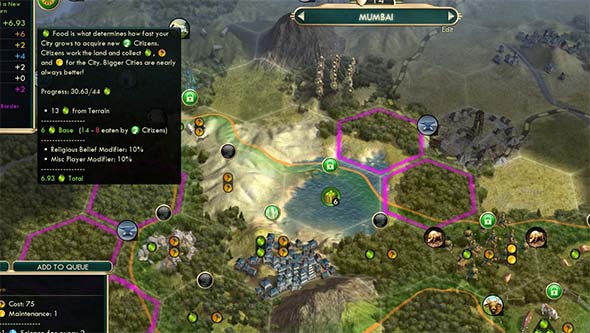
The Lake Victoria natural wonder is a great place for an Indian city.
Ideologies and victory
Since India can compete for any victory type, you are free to adopt whichever ideology best suits your needs and playstyle. The extra tourism from Mughal Forts adds a small cultural victory flavor, which might make Freedom and Order slightly more compelling, but you can really go in any direction with India.
Freedom to spawn great people
Adopting Civil Society and Avant Garde with your first two tenets is a good call. Specialists will consume only half the food, allowing your cities to support more specialists while still growing effectively, as well as generating +25% great people birth rate. If you get a level 2 tenet, then Universal Suffrage is probably your best bet. All those specialists that you are supporting will generate half unhappiness, and your Golden Ages (of which your surplus happiness should be generating many) will be 50% longer.
Since your cities should all have the core growth buildings (Water Mills, Hospitals, and Medical Labs), the Urbanization tenet is another valuable level 2 tenet for India (these buildings will generate +1 local happiness) if you chose to continue to fill out the ideology tree.
Order up some happiness
If you want to turn that free tourism from the Mughal Fort into a potential culture victory, then Order is a good option. Gandhi's A.I. seems to favor Order due to the large amounts of happiness it can offer, and also since it has strong cultural victory potential.
Resettlement will start newly-founded cities with 3 extra population, which is halfway towards hitting the break-even point. Of course, this isn't very helpful this late in the game, as you are unlikely to be founding new cities. But if you need to settle several new cities in order to acquire a late-game resource such as coal, oil, aluminum, or uranium, then this could be a good option.
Your large cities should have lots of specialists, so Hero of the People will speed up great people birth rates by 25%. Iron Curtain can also boost growth and support more specialists since it adds 50% to the food and production generated by internal trade routes, which you should be using a lot as India. It also provides a free Courthouse in captured cities if you annex it immediately. This is helpful for avoiding the excessive penalties of occupied cities, since such cities generate extra unhappiness from the city, but don't generate less unhappiness from occupied population.
Lastly, Worker's Faculties is an awesome tenet for any civ, but with large Indian cities, it should be even more potent. Each city with a factory will generate +25% science, and having higher populations will make this even more potent.

A happy autocrat
If you do adopt Autocracy, then the Prora world wonder is a must-build! The extra culture from the Mughal Forts should have been worth an extra couple social policies by this point in the game, and this wonder will convert those extra policies into extra global happiness. It will also grant you a free policy which you can use to adopt another Autocracy tenet.
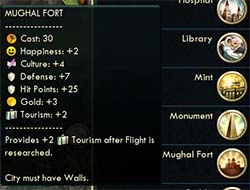
Mughal Fort buffed with Neuschwanstein
and Fortified Borders
The Mughal Fort also makes Fortified Borders very appealing. You'll want Mughal Forts in all your cities for the free culture and tourism, and this policy will grant an additional Happiness to them as well. Best of all, if you have a large puppet empire, those cities will put high priority on the maintenance-free defense buildings (after building gold-generating buildings), so you'll get the extra culture, tourism, and happiness from puppets as well. If you decide to annex any of these conquered cities, then 2nd-tier tenet Police State will provide extra happiness from Courthouses and a discount towards building them. This +3 happiness will offset the extra unhappiness from the annexed city.
In order to further promote growth, Third Alternative is another good 2nd-tier option. It will grant +5 food and science in the capital, as well as provide double strategic resources.
Violence is the answer: countering Gandhi's India
India's trait does make it very difficult for India to expand early in the game and still maintain positive happiness. This makes them a ripe target for conquest by civilizations that have early-game military buffs such as Assyria, Greeks, Huns, Zulu, and so on. The War Elephant can be a bit of an issue (since its a ranged unit and not particularly vulnerable to Spears or Pikes), but it is slow, so you should be able to deal with it if you have mobile support.
Gandhi is not a particularly difficult A.I. to beat. He rarely expands and likes to spend too much time building wonders instead of units, thus leaving himself vulnerable to early war rushes. He is usually a push-over against any decent army. His Mughal Fort doesn't provide any additional defensive bonuses, so his cities aren't particularly harder to capture.
Gandhi does have the highest nuke flavor in the game (a score of 12 out of 10 - you read that right!). So if he survives into the Modern era, he will find Uranium, and he will build nukes! However, he also has a very low aggression score. So even though he will have an arsenal of nukes in his back pocket, he is unlikely to turn aggro and usher in a nuclear winter unless provoked. I think the idea is that he would build them as a deterrent (mutually-assured destruction). If you're playing for domination, make sure that you have dealt with Gandhi prior to the atomic era so that you don't end up with your own capital covered in fallout.
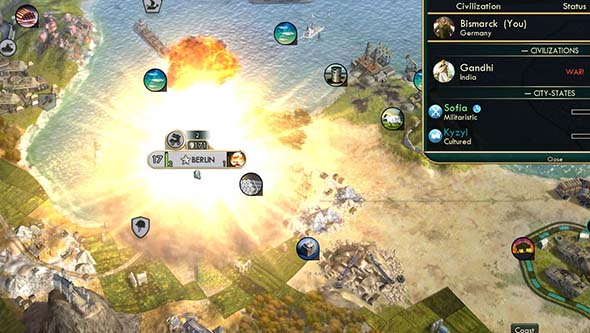
Take Gandhi out sooner (when he's easy to deal with) rather than later,
so that you can avoid being nuked by him.
Putting India in a hunger strike
If you prefer neutralizing India in more non-violent ways, then your best bet is to do everything you can to prevent him from cashing in on his double happiness from Population Growth. Avoid trading luxuries to him and try not to let him befriend or ally with Mercantile or Maritime City-States. Keep valuable growth and happiness wonders such as Temple of Artemis, Hanging Gardens, and Notre Dame out of his greedy paws if you can.
On higher difficulty levels, the A.I.s receive large surpluses of free happiness, and so the negative side of Population Growth is rarely ever a factor for an A.I.-controlled India. So most of your efforts will likely be in vain. But keeping happiness sources out of the hands of a human-controlled India can dramatically slow down his expansion plans.
Maintaining an open state of war without capturing his cities or capital can also be a good way to keep India in check. Pillage and camp your units on his food resources and plunder any trade routes that he uses to send food to his cities. You can also try bribing more violent civs to take India out if he becomes too much of a threat to your own plans.
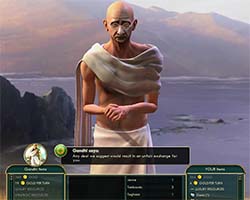
Gifting unwanted captured cities to India is a
good way to inflate his unhappiness.
But only on lower difficulties.
If you want to be particularly nefarious (on lower difficulties), then you can settle or capture cities (especially ones in tundra and desert that won't grow) and then gift them to India. This will rapidly inflate his unhappiness, which can cripple his growth, production, and military capabilities. Gifting him your own cities most likely isn't worth the time and effort on your part, but if you are conquering anyway, go ahead and gift captured cities to Gandhi instead of razing them. The cities will become puppets, and so the population won't count as "occupied" (and thus ineligible for the happiness discount), but the extra cities can put a big hole in his happiness surplus.
Peaceful co-existence
Gandhi is one of the friendliest and most loyal leaders in the game. He is very willing to make declarations of friendship, and he generally prefers to avoid wars when possible. Because of this, he can make for a very good ally if you are aiming for a more peaceful strategy. Helping him defend his land from invaders and even helping him to grow his cities quickly (by letting him ally with Maritime city states) will result in him having a lot of gold and science, which makes him a great Research Agreement and trading partner. If you want to help Gandhi to grow, then send trade routes to his cities so that he can focus his own trade routes on sending food to his own cities. Just be careful that you don't let him get too much of a head start towards a victory condition.
Discuss this strategy on Civfanatics:
http://forums.civfanatics.com/showthread.php?t=538199
or on the official 2K Civilization V forums:
http://forums.2k.com/showthread.php?
822591-A-general-strategy-for-India-(BNW)
Listen to the discussion on PolyCast, Episode 216, 03m57s (Dec 13, 2014):
http://civcomm.civfanatics.com/polycast/polycast/season8/episode216.mp3